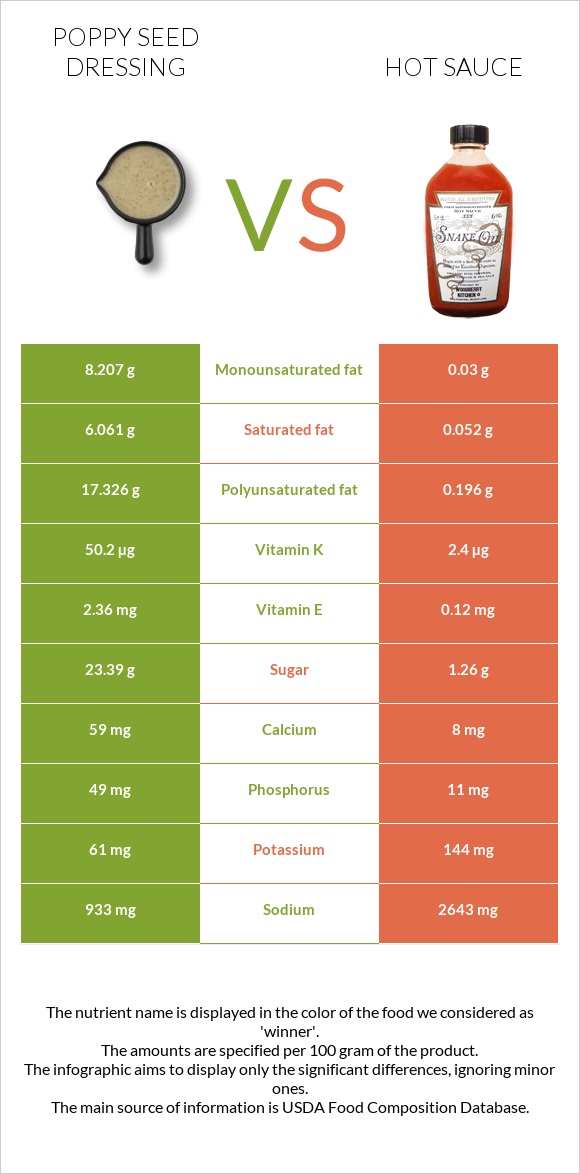Poppy seed dressing vs. Hot sauce — In-Depth Nutrition Comparison
Compare
Important differences between poppy seed dressing and hot sauce
- Poppy seed dressing has more vitamin K, vitamin E, phosphorus, calcium, and polyunsaturated fat; however, hot sauce has more vitamin C and vitamin B6.
- Hot sauce's daily need coverage for vitamin C is 83% more.
- Poppy seed dressing has 117 times more saturated fat than hot sauce. Poppy seed dressing has 6.061g of saturated fat, while hot sauce has 0.052g.
The food varieties used in the comparison are Salad dressing, poppyseed, creamy and Sauce, ready-to-serve, pepper or hot.
Infographic

Infographic link
Mineral Comparison
Mineral comparison score is based on the number of minerals by which one or the other food is richer. The "coverage" charts below show how much of the daily needs can be covered by 300 grams of the food.
| Contains more MagnesiumMagnesium | +80% |
| Contains more CalciumCalcium | +637.5% |
| Contains more CopperCopper | +25% |
| Contains more ZincZinc | +127.3% |
| Contains more PhosphorusPhosphorus | +345.5% |
| Contains less SodiumSodium | -64.7% |
| Contains more ManganeseManganese | +167.3% |
| Contains more SeleniumSelenium | +∞% |
| Contains more PotassiumPotassium | +136.1% |
| Contains more IronIron | +92% |
Vitamin Comparison
Vitamin comparison score is based on the number of vitamins by which one or the other food is richer. The "coverage" charts below show how much of the daily needs can be covered by 300 grams of the food.
| Contains more Vitamin AVitamin A | +537.5% |
| Contains more Vitamin EVitamin E | +1866.7% |
| Contains more Vitamin DVitamin D | +∞% |
| Contains more Vitamin B12Vitamin B12 | +∞% |
| Contains more Vitamin KVitamin K | +1991.7% |
| Contains more Vitamin CVitamin C | +24833.3% |
| Contains more Vitamin B1Vitamin B1 | +50% |
| Contains more Vitamin B2Vitamin B2 | +41.4% |
| Contains more Vitamin B3Vitamin B3 | +440.4% |
| Contains more Vitamin B6Vitamin B6 | +613.6% |
| Contains more FolateFolate | +100% |
All nutrients comparison - raw data values
| Nutrient |  |
 |
DV% diff. |
| Polyunsaturated fat | 17.326g | 0.196g | 114% |
| Vitamin C | 0.3mg | 74.8mg | 83% |
| Sodium | 933mg | 2643mg | 74% |
| Fats | 33.33g | 0.37g | 51% |
| Vitamin K | 50.2µg | 2.4µg | 40% |
| Saturated fat | 6.061g | 0.052g | 27% |
| Monounsaturated fat | 8.207g | 0.03g | 20% |
| Calories | 399kcal | 11kcal | 19% |
| Vitamin E | 2.36mg | 0.12mg | 15% |
| Vitamin B6 | 0.022mg | 0.157mg | 10% |
| Carbs | 23.73g | 1.75g | 7% |
| Cholesterol | 15mg | 0mg | 5% |
| Calcium | 59mg | 8mg | 5% |
| Phosphorus | 49mg | 11mg | 5% |
| Vitamin A | 51µg | 8µg | 5% |
| Manganese | 0.131mg | 0.049mg | 4% |
| Vitamin B12 | 0.09µg | 0µg | 4% |
| Iron | 0.25mg | 0.48mg | 3% |
| Potassium | 61mg | 144mg | 2% |
| Selenium | 1.2µg | 0µg | 2% |
| Vitamin B2 | 0.058mg | 0.082mg | 2% |
| Protein | 0.92g | 0.51g | 1% |
| Vitamin D | 4 IU | 1% | |
| Magnesium | 9mg | 5mg | 1% |
| Copper | 0.035mg | 0.028mg | 1% |
| Zinc | 0.25mg | 0.11mg | 1% |
| Vitamin D | 0.1µg | 1% | |
| Vitamin B1 | 0.024mg | 0.036mg | 1% |
| Vitamin B3 | 0.047mg | 0.254mg | 1% |
| Folate | 3µg | 6µg | 1% |
| Choline | 6mg | 1% | |
| Net carbs | 23.43g | 1.45g | N/A |
| Sugar | 23.39g | 1.26g | N/A |
| Fiber | 0.3g | 0.3g | 0% |
| Vitamin B5 | 0.108mg | 0.11mg | 0% |
| Trans fat | 0.144g | N/A | |
| Tryptophan | 0.007mg | 0% | |
| Threonine | 0.019mg | 0% | |
| Isoleucine | 0.017mg | 0% | |
| Leucine | 0.027mg | 0% | |
| Lysine | 0.023mg | 0% | |
| Methionine | 0.006mg | 0% | |
| Phenylalanine | 0.016mg | 0% | |
| Valine | 0.022mg | 0% | |
| Histidine | 0.01mg | 0% |
Macronutrient Comparison
Macronutrient breakdown side-by-side comparison
Protein:
0.92 g
Fats:
33.33 g
Carbs:
23.73 g
Water:
38.85 g
Other:
3.17 g
Protein:
0.51 g
Fats:
0.37 g
Carbs:
1.75 g
Water:
89.98 g
Other:
7.39 g
| Contains more ProteinProtein | +80.4% |
| Contains more FatsFats | +8908.1% |
| Contains more CarbsCarbs | +1256% |
| Contains more WaterWater | +131.6% |
| Contains more OtherOther | +133.1% |
Fat Type Comparison
Fat type breakdown side-by-side comparison
Saturated fat:
Sat. Fat
6.061 g
Monounsaturated fat:
Mono. Fat
8.207 g
Polyunsaturated fat:
Poly. Fat
17.326 g
Saturated fat:
Sat. Fat
0.052 g
Monounsaturated fat:
Mono. Fat
0.03 g
Polyunsaturated fat:
Poly. Fat
0.196 g
| Contains more Mono. FatMonounsaturated fat | +27256.7% |
| Contains more Poly. FatPolyunsaturated fat | +8739.8% |
| Contains less Sat. FatSaturated fat | -99.1% |





